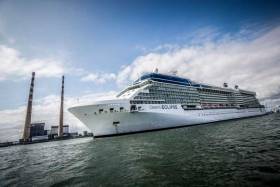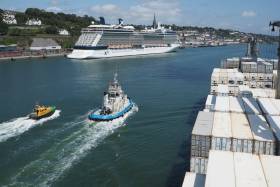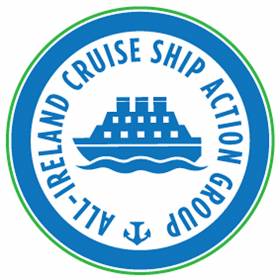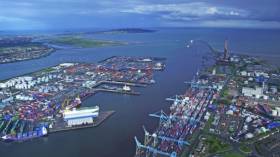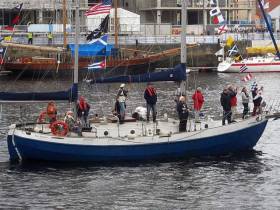Displaying items by tag: Dublin Port
Dublin Port Company (DPC) has today announced an initiative to decrease the dwell time of containers and trailers at Dublin Port so as to increase the Port’s throughput capacity for future growth.
As Afloat reported earlier, Phase 1 of the Dublin Port Dwell Time Initiative* will see DPC reduce the free time period allowed for containers and trailers (from seven days to four days) at one of the three container terminals in Dublin Port which handles trade with Continental Europe. DPC will also double the daily quay charges applied after this free period (from €20 per day to €40 per day for a 40’ container).
The changes come into effect on 1st June 2019 and will apply to container and trailer traffic using the terminal operated by Doyle Shipping Group (DSG). The terminal is owned and controlled by Dublin Port Company.
Dwell Time refers to the amount of time an import container or trailer spends waiting to be picked up at a terminal after being unloaded from a ship (or the time an export container or trailer spends in a terminal before being loaded onto a ship). After the allowed free period, daily quay charges are applied until the container or trailer leaves the terminal.
DPC is introducing the measure in order to maximise the use of land at the terminal. Shorter dwell times will lead to fewer containers being stored for longer than necessary, thereby freeing up space for more cargo to move through the same amount of land. This increases port capacity.
Q1 2019 Trade Figures
The initiative comes as new trade figures for Q1 2019 reveal that Dublin Port experienced its busiest single month on record with throughput of 3.4m gross tonnes in March, with overall cargo volumes for the first quarter up by 7.0%. The first quarter growth to 9.7 million gross tonnes came from both rising imports (+8.0%) and increasing exports (+5.6%).
Brexit Impact
The terminal operated by DSG accounts for 45% of containers and trailers moving between Dublin and ports in Continental Europe and beyond. DPC is already seeing accelerating growth on direct routes to Continental Europe in advance of Brexit.
The need to maximise the use of land at Dublin Port is more pressing following the loss of eight hectares of port lands to State Agencies for secondary inspection facilities required after Brexit. Although eight hectares equates to only 3% of the overall land area at Dublin Port it represents 25% of the port lands available for development for the transit storage of freight in containers and trailers under Masterplan 2040.
Eamonn O’Reilly, Chief Executive, Dublin Port Company, said;
“Our container terminals are operating at half of the target land utilisation we set for them in our Franchise Policy in 2014. One of the impacts of Brexit is that we have to achieve these targets sooner. The Dublin Port Dwell Time Initiative provides essential financial incentives to move cargo through the port more quickly.
“I am calling on the operators of the two leased container terminals – ICG’s DFT Container Terminal and Peel Ports – to follow our example and become similarly ambitious in the efficient use of Dublin Port land.
“It is no longer acceptable for shipping lines and container terminals to compete with each other based on how inefficiently they use scarce port lands. We are focussing first on Dublin Port’s three container terminals and our objective is to reduce average dwell times in the three terminals to two days by the end of 2021.
“The changes we are introducing will require significant alterations in supply chains. With volumes growing rapidly and Dublin Port set to reach full capacity by 2040, the days of container terminals in Dublin Port providing free or very cheap storage for importers or exporters are coming to an end.
“With all the economic uncertainty, volumes through Dublin Port are remarkably robust and underpin the need for us to continue to invest in additional port infrastructure guided by our own Masterplan 2040 and by Project Ireland 2040. We are currently seeking Government approval for company borrowings of €300m to continue the Port’s ambitious and essential ten-year €1 billion investment programme.”
DublinTown, the not for profit organisation charged with creating a welcoming and economically viable city environment in Dublin, has urged Dublin Port to provide clarity in relation to its decision to severely restrict cruise ship tourism to Ireland. Dublin Port recently announced that it is to cut cruise ship calls to the city by more than 50%, from 172 in 2018 to 80 in 2021. Between March and October this year, the country will receive almost 300,000 passengers and crew and from cruise ships stopping in Dublin Port, before moving on to destinations like Cobh, Waterford and Belfast.
Richard Guiney, CEO of DublinTown, has made a number of requests of Dublin Port, stating: “DublinTown, on behalf of its members, would like to ask the port to make an unambiguous statement on its intentions in relation to cruise tourism.
“Cruise tourism has become an important element of trade for many city businesses. This ranges across independent retail, publicans and coach operators. Cruise tourists actively seek Irish craft and spend handsomely within the city. Based on feedback from both the port and cruise line companies, many were optimistic, that this trade was set to grow, particularly through home porting where the cruise both begins and ends in Dublin. Cruise lines have let it be known that without Dublin, Ireland becomes an unattractive destination with serious consequences for Cork, Waterford and Belfast. We have seen that Northern Ireland’s First Minister has raised the issue with Minister Shane Ross.
“In recent weeks we have heard mixed statements and intentions. There is a need for clarity. We would like Dublin Port to answer the following questions?
There will be 172 cruise ships visiting Dublin Port in 2019. We were told that there will be 80 in 2021. However, it would appear that many of these are smaller ships and that perhaps as little as 30-40 of the ships we have come to know will be accommodated in 2021. For clarity can the port advise how many passengers will visit in Dublin 2019 and how many will visit in 2021?
Through media reports we have been advised that the reductions are of a temporary nature and that there is an intention to return to 150 ships in 2023 and that this number would be grown thereafter. Can Dublin Port answer unambiguously if an agreement on these numbers has been agreed with the cruise lines? Can we have a categoric commitment from the port in relation to this stated intention?
How many cruise passengers and cruise ship crew does Dublin Port intend to welcome in 2023?
We understand that a decision was conveyed to the cruise lines that it was the port’s intention to cease home porting. Is this the case? If not, how many cruise ships will homeport in Dublin in 2023?
Why has Dublin Port withdrawn from Cruise Ireland and Cruise Europe, and why has it ceased attending cruise events and trade shows if the retrenchment is temporary? Given the need to maintain contacts and goodwill, is the port willing to reconsider its decision to withdraw from these groups and re-engage fully with the industry?
What steps does Dublin Port intend to take to repair the damage done to Ireland’s reputation as a tourist destination caused by how it has handled and communicated its decision?
“The communication of the port’s decision has, unfortunately, lent itself to rumour and a degree of concern. There is no doubt that there has been some anger and frustration amongst key stakeholders. Cruise tourism is an important matter for our members, and we believe that it is incumbent on Dublin Port to engage with openness and transparency with those whose livelihoods have been compromised by its decision.”
#cruiseliners - Independent.ie reports in a reduction in the number of cruise ships entering Dublin Port will cause considerable damage to the tourism sector on the island of Ireland, the leader of the DUP has warned.
It is understood that Arlene Foster has been in contact with transport minister Shane Ross to outline the impact that reduced cruises will have on both sides of the border. Foster fears that companies may now go elsewhere.
It follows news that the Dublin Port Company was considering curtailing its cruise business in order to make way for more freight after Brexit. Business groups have heavily lobbied against the port's decision insisting it could heavily damage businesses in the city.
More on the story here.
#cruiseliners - The Port of Cork writes the Irish Examiner, is expected to take advantage of a lack of space in Dublin Port for large cruise ships when Brexit forces authorities in the capital to handle increased amounts of freight and cargo.
Transport Minister Shane Ross described a decision by Dublin Port to significantly reduce its intake of cruise ships in the next two years as a “temporary blip”.
But the port's decision has triggered frustration among tourism services and cruise companies, especially if the €50m annual industry is damaged.
In the Dáil, Mr Ross said he was keen to reduce any adverse impacts on tourism.
He said Dublin Port authorities had briefed him about its priorities for Brexit and the need for extra cargo space.
“Given space constraints, it was explained that cruise berths will have to be limited for a period from 2021 onwards to allow this construction work to take place, while ensuring the port can continue to handle large cargo volumes,” the minister explained.
The newspaper has more on the topic here.
A group of businesses across the tourism, retail and transport sectors have come together to campaign against the Dublin Port Company’s surprise ban on cruise ships entering Dublin Port from 2021. The group, which will be known as the All-Ireland Cruise Ship Action Group (AICSAG) was launched today at an event in Buswells Hotel in Dublin.
The group was formed following Dublin Port’s recent decision is in stark contrast to their activity in the past ten years of promoting Dublin Port as a cruise destination and highlighting the benefits cruise ships bring to the Irish economy and tourism business.
As Afloat reported yesterday, Dublin Town, the not for profit organisation charged with creating a welcoming and economically viable city environment in Dublin, has also urged Dublin Port to reconsider its decision to cut cruise ship calls.
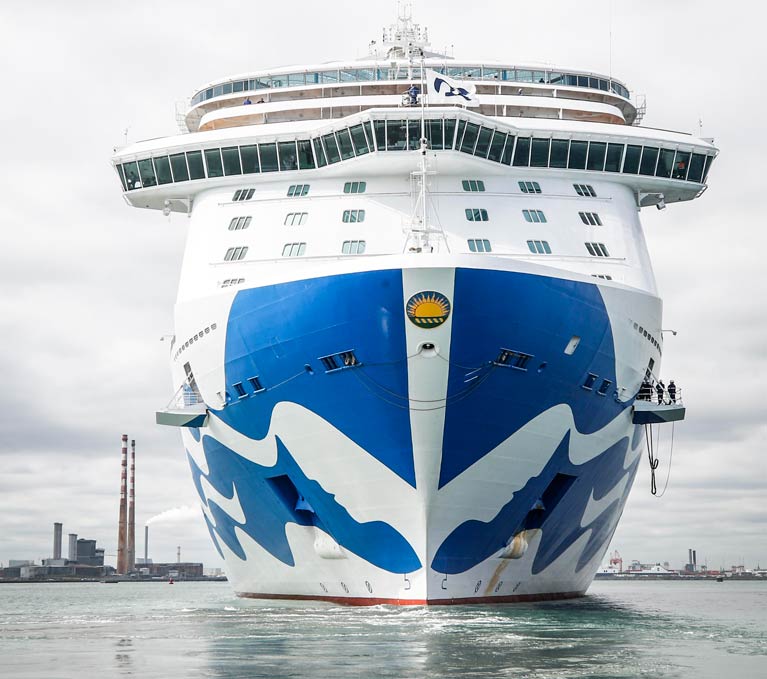 The 330m Royal Princess cruise ship that arrived in Dublin last year carrying more than 3,000 passengers and crew. Her arrival kickstarted a record cruise season for Dublin Port with 151 cruise calls confirmed for 2018, bringing just over 270,000 visitors to the city in 2018. Photo: Conor McCabe Photography.
The 330m Royal Princess cruise ship that arrived in Dublin last year carrying more than 3,000 passengers and crew. Her arrival kickstarted a record cruise season for Dublin Port with 151 cruise calls confirmed for 2018, bringing just over 270,000 visitors to the city in 2018. Photo: Conor McCabe Photography.
AICSAG will be ramping up its campaign to reverse the decision by hosting a series of roadshows and media briefings across the island of Ireland, stopping off at principal locations such as Belfast, Cork and Waterford before travelling to the west and northwest of Ireland. The group is made up of concerned businesses in the retail, transport and tourism sectors who will be severely impacted by Dublin Port’s move. The group has the backing of DublinTown and Retail Excellence Ireland.
According to the Group’s spokesperson Niamh McCarthy, Chief Executive of Excursions Ireland, the Dublin Port Company’s decision will ‘’devastate Irish tourism and is driving a death nail into our business. Last year, cruise ships brought over 442,000 visitors to Ireland and generated over €50 million for the Irish economy. If Dublin Port is allowed to go ahead with its plan, all of this will be lost forever. We are calling on Government and the Minister for Transport, Tourism and Sport to take immediate action to protect our jobs and businesses.’’
Niamh went on to say; ‘’for the past ten years, the Dublin Port Company have played an important role by increasing the numbers of cruise ships docking in Dublin and were at the forefront of highlighting their benefit to the Irish economy. Dublin Port have performed a complete sea change, to everyone’s amazement. Their latest damaging strategy has come out of nowhere and will risk the many thousands of jobs in Ireland dependent on the sector. This sudden change in policy is a total shock to both the all-Ireland tourism sector and its international stakeholders.’’
According to the other spokesperson, AICSAG member Feargal Barton of Barton’s Transport, the Dublin Port Company’s decision will also have a catastrophic impact on Ireland’s other port cities of Belfast, Cork and Waterford. ‘‘The cruise companies market Ireland as a destination, and in addition to Dublin the cruise ships stop off at Belfast, Waterford and Cork. Without access to Dublin Port, cruise companies will no longer stop in other Irish ports and will take their business to other European destinations. The cruise companies arrange cruises and marketing plans two years in advance, so urgent action is required to save the business for the 2021 season.’’
The recent decision by the Dublin Port Company to stop cruise ships docking at Dublin Port from 2021 was taken without any consultations or engagement with the Minister for Transport, Tourism and Sport, local businesses, Dublin City Council, or the other Irish ports, namely Belfast, Waterford and Cork, who will be severely impacted by this decision.
Dublin Town, the not for profit organisation charged with creating a welcoming and economically viable city environment in Dublin, has urged Dublin Port to reconsider its decision to cut cruise ship calls to the city by more than 50%, from 172 in 2018 to 80 in 2021. Between March and October, the country will receive almost 200,000 visitors from cruise ships stopping in Dublin Port, before moving on to destinations like Cobh, Waterford and Belfast.
Richard Guiney, CEO of Dublin Town, said about the move: “In the coming days, Ireland will welcome the first cruise ship of the season to Dublin Port. This growing trade has come from a standing start to now adding between up to €35m to the local economy. However, all this has now been put in jeopardy by Dublin Port’s decision to drastically cut the number of passenger ships coming into the capital by more than 50 percent from 2021; a decision that we believe must be reversed.
“The move will have disastrous consequences for tourism in the city. However, it won’t just be Dublin that will suffer from this decision. It is likely that the number of cruise calls will dramatically drop across all Irish ports as a result of Dublin Port’s plans to deny access to the capital. If cruise operators remove Ireland from their itineraries now, it could prove virtually impossible to win them back. By sending out this message, Ireland may end up losing this vital resource forever.
"Dublin Port has an essential role in supporting the growing tourism sector in Ireland"
“Dublin Port has an essential role in supporting the growing tourism sector in Ireland and has established the city as a valued destination for the international cruise industry. In 2013, 102 cruise ships docked in Dublin, in 2019 it will be 172. Indeed, there is every indication that we could rival the 300 ships visiting Copenhagen in the coming years, thereby growing visitor spend to well more than €50m and more per annum.”
“Dublin has also grown its homeporting business, where ships both begin and end their journeys in Dublin, adding hotel bed nights and extended Irish stays to the passenger itinerary. This greatly increases visitor spend within the Irish economy. Homeporting in Dublin began in 2018 and was expected to reach 22 ships in the coming years.
“DublinTown has found that the ships’ crews are spending both time and money in the city, particularly when Dublin is the home port. Crews can be found seeking out essential supplies while here, spending their free time visiting clothes shops and enjoying the city. Failte Ireland has set the ambitious but achievable target to double Dublin’s tourist numbers by 2025. However, this target becomes much taller when we restrict access and send a message that tourists are not valued.
“Dublin Town has Visitor Assistants on each of the cruise ships that visit Dublin. This personnel assist passengers in maximising their short stay here. 45% of cruise ship passengers will have pre-booked excursions leaving from Dublin Port. The feedback from our cruise visitors is exceptional and represents an opportunity for Dublin to encourage those passengers back for a longer city break in the fair city. The key to growing our valuable tourism numbers lies in encouraging them to sample more of the city offering and adding to their ‘must see’ lists for their second and subsequent stays. Cruise tourism certainly facilitates this pattern.”
“The city has come to rely on cruise ship tourists and, at a time when Brexit has brought a decline in tourist numbers from Britain to Ireland, it is important that Dublin Port works with the rest of the city to increase the flow of passengers rather than curtail it. Dublin is in a unique position as the proximity of the port to the city means we can offer access for passengers in a way that other European capitals cannot rival. In this context, we must look at how we use our infrastructure to our national advantage. If Dublin Port believes that it has more freight traffic than it can accommodate then Government has a role to step in and facilitate its transfer to other ports. This must be done in the context of the national interest and not in the interests of one infrastructure provider. Ireland has for too long had a tradition of silo thinking which has held us back. We need to consider the bigger picture and assess how we can grow our national economy, and both create and sustain employment. Tourism in general and cruise ship tourism, in particular, have important roles to play in this regard.
“At DublinTown, we urge Dublin Port to work with the Irish Government and the cruise industry to build cruise tourism sustainably across Ireland. Minister Ross must be concerned about the impact this will have on his portfolio. Having overseen the increase in VAT from 9% to 13.5%, maintaining this important and growing element to the tourism package in Dublin will be an important element of the Minister’s legacy. Here is the perfect opportunity to show that he can help the industry grow.”
Boss of Port of Cork Warns Cork Tourism Could Suffer from Dublin's Cruise Ship Crisis
#portofcork - Chairman of the Port of Cork has warned that the lucrative cruise tourism sector on Leeside could take a serious hit because of Dublin Port’s decision to halve its cruise ship business.
As EchoLive.ie writes, John Mullins said a predicted leap in the number of cruise passengers visiting Cork and plans for further investment in the sector have been put at risk following the shock announcement in recent days.
Dublin Port has revealed plans to reduce the number of cruise ships allowed into the capital from 160 this year to 80 in 2021 because of the need for increased capacity for container traffic when the UK leaves the EU.
Mr Mullins said this could have a worrying impact on the cruise trade in Cork.
Click here for more.
Faroese-Flagged Caller to Dun Laoghaire Harbour Highlights Capacity Constraints in Dublin Port
#dublinbay- A unusual caller to Dun Laoghaire Harbour is a Faroese Islands flagged research survey vessel that is docked in the port due to berth capacity restrictions in neighbouring Dublin Port, writes Jehan Ashmore.
The 55m RSV Franklin which is listed on the Faroese International Ship Register, had arrived to the harbour just over a week ago having berthed alongside Carlisle Pier. There are currently 92 vessels owned on the islands which are a self-governing archipelago that form part of the Kingdom of Denmark.
This is not the first time ships in Dublin Port have been forced to use a berth in Dun Laoghaire Harbour as most recently, the Dutch flagged dredger Freeway as Afloat reported made a request late last year to enter the port and avail of a berth.
It was ironic that the trailing suction dredger which was carrying out works on behalf of Dublin Port had to spend a lay-over period in Dun Laoghaire Harbour. On that occasion during late December and into the New Year, the 92m vessel had also occupied Carlisle Pier due to the limited capacity available in the capital port.
As also previously reported on Afloat, last month Dublin Port announced that due to rising freight volumes and the need to create space due to Brexit, prioritisation of freight over tourism is to take place. The decision by Dublin Port to curtail cruiseships in using its facilities from 2021 has raised concerns among the wider Irish tourism industry.
In addition the proposed cruise-berth for Dun Laoghaire unveiled almost four years ago, is among a trio of multi-million euro projects that have been thrown into question by Dún Laoghaire-Rathdown County Council which cited both lack of funds and viability.
The south Dublin Bay harbour was under the control of Dun Laoghaire Harbour Company until a transfer took place last year to the local authority.
Since Stena Line withdrew the HSS fastferry service to Holyhead, Wales in 2014, the port has no major anchor tennant. It was 25 years ago that the operator chartered in another Faroese-flagged vessel Smyril Line's ferry Norröna (built 1973) which was a highly unusual move, given historically other ferries would of been pooled from Stena's extensive fleet.
The only vessels currently calling to the harbour on a year-round basis is the fleet of the Naval Service and ILV Granuaile, the aids to navigation tender belonging to Irish Lights which has its headquarters located on the harbour waterfront.
As for the 1,178 tonne RSV Franklin which is expected to depart the harbour by the end of this week.
New Dublin Port Customs Check Posts Will Be ‘Pinch Point’ Says CEO
New customs checkpoints in Dublin Port are expected to be a ‘pinch point’ for hauliers, according to the port company’s chief executive.
Eamonn O'Reilly tells RTÉ News that delays are likely to result from the new border inspection posts as Brexit would see a dramatic overnight increase in non-EU trade.
The new checkpoints are the first to be built in the port for decades, as their necessity waned in the 1990s thanks to free trade within the EU.
As previously reported on Afloat.ie, all sea freight requiring checks post-Brexit will be inspected at a 13,000m warehouse formerly owned by businessman Harry Crosbie.
Two of my favourite waterside places along the Liffey are in Dublin Port – Ringsend and Poolbeg.
The maritime history of Ringsend is part of the marine story of Ireland, an area resonant of seafaring history and Poolbeg Yacht and Boat Club is a place where, whenever I have been there, has always been welcoming, with a warm friendship of the sea.
They are both connected with a marine project which shows how the sea can influence lives in a very positive way, reaching out to those who may not have had any previous connection with it.
"The maritime history of Ringsend is part of the marine story of Ireland"
The 42 ft. ketch, the Rinn Voyager, is well known and has impressed me when I’ve seen her at Poolbeg. But she is much more than just a nice boat. She is the maritime face of a project which has helped to preserve marine skills and rehabilitated marginalised, disadvantaged people and recovering addicts. More than 7,000 users of the Drugs & Alcohol Task Force have benefited from the project. It is the embodiment of positive community and social activism. Dublin Port, with its programme of reaching out to the community, has been a strong supporter. FáS supported the project and so did many others and unemployed people, people with boat-building skills and school leavers built it. As a result, skills were maintained, passed on to younger people. Twenty-five years since it was launched, when the Rinn Voyager Sailing Project began, one of the hopes would be for a second vessel like the Rinn Voyager to increase the reach of the project.
Listen to the Podcast below as Denis Murphy describes what this special vessel, the Rinn Voyager, has achieved.



























